Logistics and Shipping Mobile App Features: Explore Today
 28 November 2023
28 November 2023As logistics and shipping operations continue to seek innovative solutions for efficiency and growth, the integration of Logistics and Shipping mobile app features has become increasingly essential. The process of mobile app development for the Logistics Industry requires crucial steps, starting with understanding the target audience and selecting the right developer. Once the development stage is complete, the app’s launch involves a significant marketing push to ensure its success.
Modern supply chain mobile applications incorporate advanced technologies, including AI, IoT, and analytics, to optimize tasks, connect devices, and generate valuable insights. With these features, logistics and shipping mobile apps offer tangible benefits to all stakeholders involved while continuously evolving with the industry’s needs.
Key Takeaways
- Mobile app development for logistics should involve a well-planned strategy, from design and development to launch and marketing.
- The choice of native or cross-platform development platforms impacts app performance, cost, and reach.
- An MVP helps in testing core features and functionality, while garnering feedback for enhancement.
- Incorporating advanced technologies like AI, IoT, and analytics can significantly improve app functionality and value.
- Efficient logistics mobile apps require features like real-time tracking, inventory management, and order processing.
- Investing in mobile app development is crucial for maintaining a competitive edge in the logistics and shipping industry.
The Evolution of Logistics and Shipping Mobile Apps
Logistics and shipping mobile apps have undergone a dramatic transformation to adapt to the growing needs of the transportation industry. These apps streamline and optimize various aspects of the supply chain, while enhancing operational productivity and minimizing costs.
The evolution of these mobile apps has been fostered by innovations in technology, which have contributed significantly to improved delivery times, warehouse management, and overall safety in storage and shipping operations.
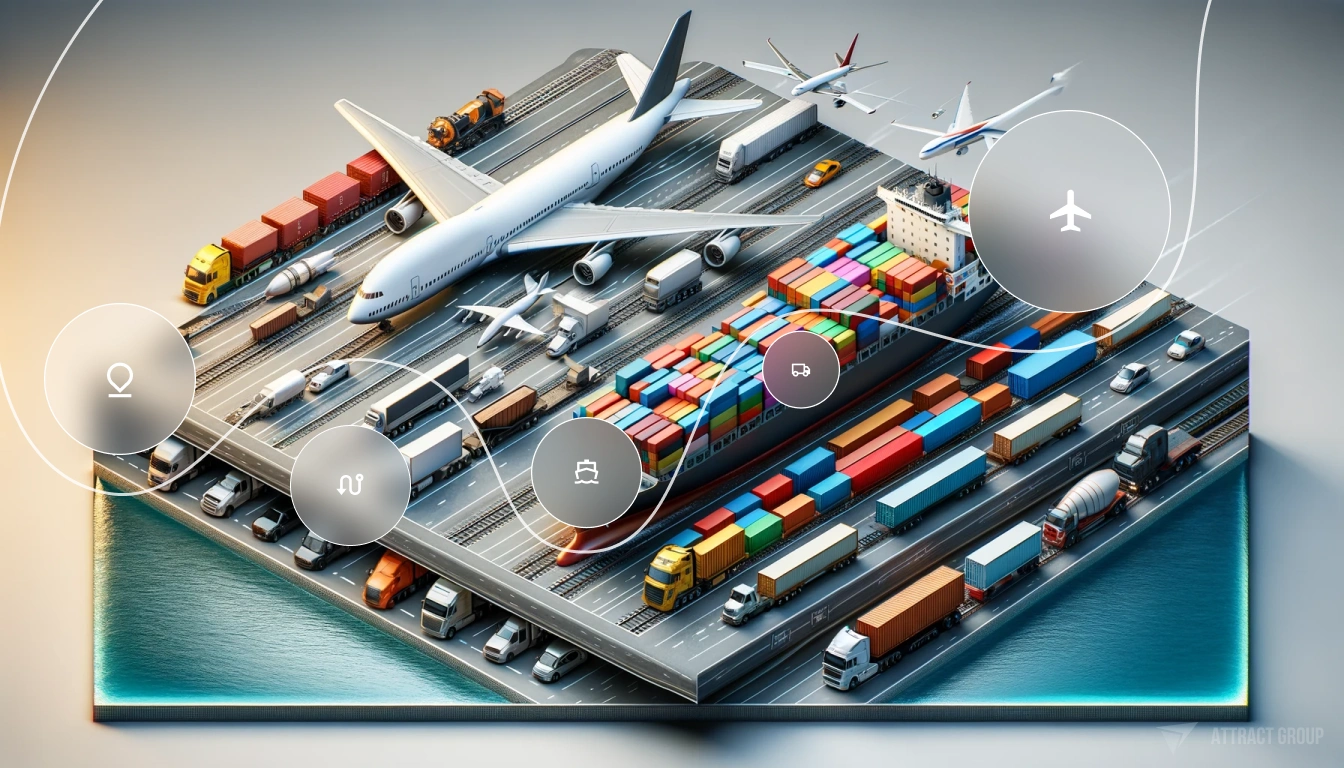
Logistics mobile apps now cater to a variety of functional areas within the transportation realm. The table below highlights some of the key areas where these apps are having a considerable impact:
| Functional Area | Description |
|---|---|
| Supply Chain Management | Mobile apps help with end-to-end management of supply chains, enabling real-time tracking and improving communication between different stakeholders. |
| Fleet and Driver Management | Shipping mobile apps facilitate fleet management by tracking vehicle location, driver performance, and overall fleet efficiency. |
| Warehouse Management | By integrating with warehouse management systems, logistics mobile apps enhance inventory management, streamline operations, and reduce operational costs. |
| Delivery Management | Mobile apps for logistics enable businesses to efficiently manage deliveries through tracking, route optimization, and real-time communication. |
The digital transformation in logistics has been accelerated in recent times by the adoption of cutting-edge technologies such as artificial intelligence (AI), the Internet of Things (IoT), and data analytics. These technologies have not only reshaped the way logistics companies operate but have also set a new benchmark for industry standards, fostering higher levels of efficiency and productivity.
“The way we think about logistics has been transformed by the rapid evolution of mobile apps. These apps now provide a range of tools to streamline and optimize every aspect of the supply chain, offering unprecedented levels of efficiency and productivity.”
In the coming years, we can expect to witness further innovations in logistics mobile app development, with an emphasis on harnessing new technologies to address the constantly evolving needs of the industry.
Key Advantages of Integrating Mobile Apps into Logistics
Logistics mobile apps empower companies with the ability to track orders, shipments, and fleet in real-time, offering numerous advantages over traditional methods. By harnessing GPS technology, inventory control, and order management features, mobile apps contribute to more efficient, transparent, and cost-effective logistics operations. This section explores the key benefits provided by integrating mobile apps into the logistics sector.
Enhancing Real-Time Tracking Capabilities
One of the most significant advantages of utilizing mobile apps in logistics is real-time tracking. This feature allows users to gain transparency over shipment locations, speeds, routes, and estimated times of arrival (ETA). It also offers the added benefit of immediate notifications of any disruptions or discrepancies in the delivery process. By integrating live shipment tracking through GPS technology, logistics companies can ensure a better overall experience for customers and enhance their operational efficiency.
Streamlining Inventory Management
Inventory management is a critical aspect of logistics operations. Mobile app inventory control has revolutionized the way companies track available stock and replenish their inventories. By facilitating precise tracking, mobile apps enable logistics companies to avoid out-of-stock scenarios and overstocking, ensuring that cargo in transit is monitored effectively. AI-based logistics mobile apps take it a step further by optimizing warehouse space and providing timely inventory status updates.
Efficient inventory management is essential for minimizing costs and maximizing profits in logistics operations.
Moreover, mobile solutions help logistics firms make data-driven decisions by offering real-time insights into stock levels, thereby increasing overall efficiency.
Work with our expert developers to build tailored logistics and shipping mobile apps with features like real-time tracking, route optimization, and inventory management
Improving Order Management Efficiency
Logistics apps are known for their ability to automate the order creation process, update order statuses, and streamline communication between customers and service providers. By integrating mobile solutions for order processing, logistics companies can minimize manual errors and expedite order fulfillment. Additionally, these apps typically feature mechanisms to generate invoices and receipts, contributing to a smoother, more efficient ordering experience for all parties involved.
- Track orders, shipments, and fleet in real-time
- Maintain transparency over shipment locations, speeds, routes, and ETA
- Provide immediate notifications of any disruptions or discrepancies
- Improve efficiency in managing inventory and orders
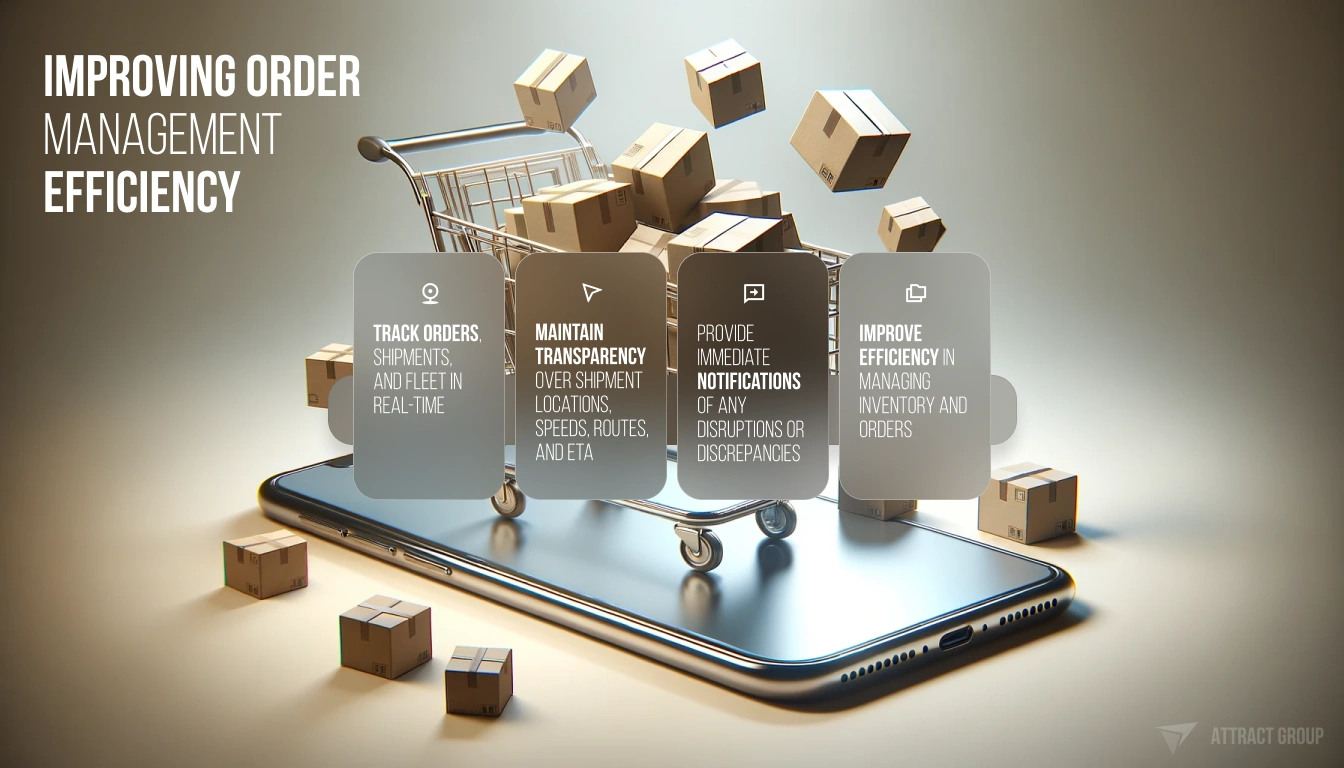
Incorporating mobile apps in logistics operations brings numerous benefits, enabling businesses to enhance their real-time tracking capabilities, streamline inventory management, and improve order management efficiency. As the industry continues to evolve, mobile solutions will likely play an increasingly critical role in facilitating better logistics experiences for customers and companies alike.
Essential Features of a Competent Logistics Mobile App
Logistics app development continues to grow in importance as the industry evolves and becomes increasingly reliant on technology. There are numerous key features of shipping mobile apps that must be incorporated to ensure maximum benefit for logistics management tools. This section will explore some of these essential capabilities, contributing to the overarching efficiency and effectiveness of logistics mobile apps.
- Truck Tracking with GPS: Real-time vehicle location is crucial for transport businesses, helping to monitor the progress of deliveries and optimize operations. GPS technology provides accurate location data, enabling swift and effective decision-making by both drivers and logistics managers.
- Route Optimization: Identifying the most efficient paths can reduce delivery times and fuel costs. Logistics mobile apps that incorporate route optimization algorithms consider various factors such as traffic, distance, and road conditions to develop the most effective routes.
- Multilingual Support: With global supply chains and an increasingly diverse workforce, providing multilingual support in logistics mobile apps is imperative. This feature ensures communication and instructions are clearly understood, eliminating potential misunderstandings.
- Offline Functionality: Intermittent connectivity should not hinder day-to-day operations. Logistics mobile apps should support offline functionality, allowing the user to work seamlessly without requiring a consistent internet connection.
- Communication Capabilities: Efficient communication between drivers and managers is fundamental for effective logistics management. Mobile apps that incorporate chat and notification features can foster a collaborative environment, aiding in smooth communication and rapid decision-making.
In addition to the above-mentioned essential features, a competent logistics mobile app should also consider:
Streamlined paperwork with electronic billing and payment confirmation, efficient fleet management, load optimization, GPS-enabled driver tracking, and integration with third-party APIs.
These functionalities substantially contribute to the app’s value, providing critical logistics management tools needed to manage operations effectively and facilitate seamless and efficient logistics processes.
Leverage our team’s experience building advanced logistics apps featuring AI, ML, IoT, and analytics to optimize your supply chain operations
Incorporating these crucial features within logistics mobile app development ensures logistical teams have the support and tools necessary to handle the complex challenges faced in an ever-growing industry.
Real-Time Tracking: Keeping an Eye on Shipments
Real-time tracking has become a standard for the logistics and shipping industry, providing transparency and maximizing operational efficiency. One of the most critical components for effective real-time tracking is the integration of GPS technology.
The Importance of GPS Technology in Shipping
GPS technology is integral to real-time tracking, offering extensive coverage and the capability to monitor vehicle movements with precision. GPS systems are now a necessity for logistics apps, enabling visibility for real-time shipment.
Some key benefits of GPS tracking in logistics include:
- Continuous vehicle location updates
- Live traffic information for efficient route planning
- Enhanced security through theft prevention and recovery
GPS technology enables logistics apps to provide live updates on vehicle locations, contributing to better customer service and heightened operational efficiency within the logistics and shipping industry.
“GPS technology has significantly improved customer service and communication in the logistics and shipping sector.”
As the demand for real-time shipment visibility continues to increase, GPS technology remains indispensable for logistics companies. The integration of GPS tracking systems optimizes various aspects of logistics operations – from vehicle security to fleet management – resulting in a more streamlined and transparent shipping experience.
| Elements | Benefits |
|---|---|
| 1. Real-time vehicle location | Better decision-making and handling of exceptions in operations |
| 2. Security and theft recovery | Reduced financial losses and improved trust and safety |
| 3. Live traffic information | Efficient route planning to avoid delays and save on fuel costs |
| 4. Geo-fencing alerts | Notifications when vehicles deviate from predefined routes or enter/exit specific zones |
| 5. Fleet and driver management | Monitoring operation costs and vehicle maintenance information, as well as ensuring driver adherence to safety regulations |
GPS tracking technology is crucial for logistics companies to achieve real-time shipment visibility and to optimize their operations. With GPS integrations in logistics apps, customers and businesses alike can monitor the progress of their shipments and maximize transparency throughout the entire supply chain.
Route Optimization Algorithms: Saving Time and Fuel
With the demand for rapid delivery times and cost-effective shipping solutions, route optimization in logistics has become a critical focus for businesses. Thanks to advancements in technology, logistics apps now include intelligent algorithms that optimize routes to not only reduce delivery times but also lower overall fuel costs.
These algorithms take into account vital factors such as traffic conditions, delivery prioritization, and the most efficient paths to select the best routes possible. This ability to optimize routes empowers companies to save cost and enhance dispatch management while also bolstering productivity. As a result, businesses in logistics and transportation can maintain a substantial competitive edge in the ever-evolving industry landscape.
Below are some main advantages of utilizing route optimization algorithms within logistics apps:
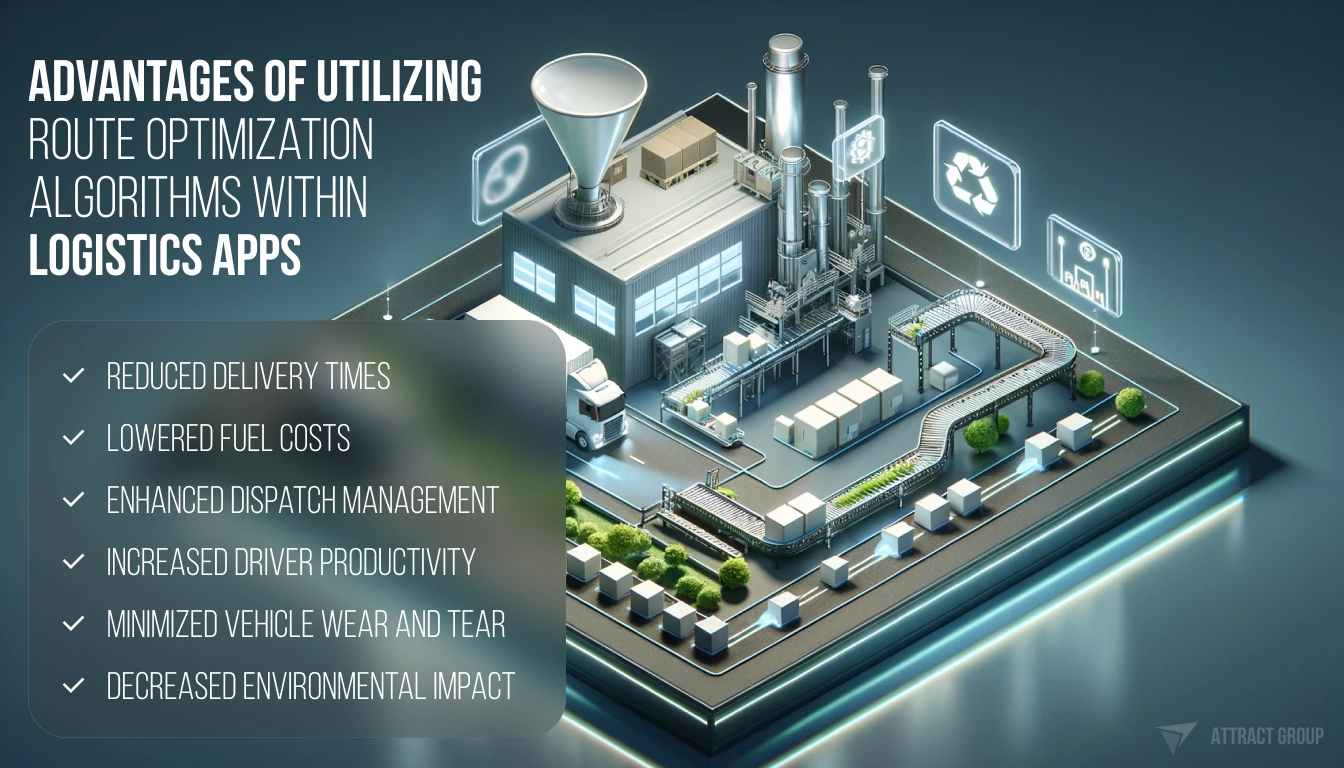
- Reduced delivery times
- Lowered fuel costs
- Enhanced dispatch management
- Increased driver productivity
- Minimized vehicle wear and tear
- Decreased environmental impact
Let’s take a closer look at some fuel-saving shipping solutions enabled by route optimization algorithms:
Dynamic Routing: Dynamic routing algorithms consider real-time traffic data, vehicle capacities, and delivery deadlines to establish the most efficient routes possible. Such dynamic solutions adapt to traffic conditions, ensuring deliveries are made on time, and fuel consumption is minimized.
Multi-Stop Route Planning: Multi-stop route planning is a powerful tool that optimizes the order of stops for drivers. By accounting for factors such as delivery time windows, vehicle capacity, and service requirements, this approach minimizes driving time and fuel usage.
These examples demonstrate how route optimization algorithms embedded within logistics apps contribute to fuel-saving shipping solutions, delivering significant benefits to businesses in the logistics and shipping sectors. By embracing these technological advancements, companies can streamline their operations and maintain a competitive edge in the industry.
Shipment Tracking: A Vital Tool for Customer Satisfaction
Modern logistics companies strive to enhance customer satisfaction by incorporating shipment tracking functionalities in their processes. Shipment tracking is a critical feature that improves transparency and trustworthiness in logistics services. It provides end-to-end visibility of shipments, right from their departure from the warehouse to their arrival at their final destinations.
Shipment tracking capabilities are integral for customer satisfaction, offering end-to-end visibility from the warehouse to the final destination, building trust with customers and improving the overall service experience.
Customer apps often include shipment tracking features that allow individuals to monitor their parcels’ progress in real-time. This added sense of control and up-to-date knowledge of their shipments’ status elevates the overall customer experience.

- Real-time tracking of shipments, with live updates on their locations
- ETA (Estimated Time of Arrival) projections based on shipment status
- Instant notifications in case of delays, damages, or other disruptions in transit
Companies must prioritize customer satisfaction, and shipment tracking features prove indispensable. By empowering customers with real-time information and setting expectations with accurate ETAs, logistics businesses can elevate their service quality, foster customer loyalty, and outshine competitors in the market.
Inventory Management: The Backbone of Logistics Operations
Inventory management plays a critical role in the success of logistics operations. Managing stock levels efficiently is necessary to maintain smooth business operations. With the advent of mobile apps, traditional inventory management practices have been revolutionized, significantly enhancing inventory accuracy and making logistics operations more agile and responsive.
Mobile apps introduce automation to inventory management processes, eliminating human error, and streamlining data entry. The real-time information furnished by these apps allows warehouse managers to proactively respond to any changes in stock levels or logistical requirements.
How Mobile Apps Revolutionize Inventory Accuracy
Mobile apps have made considerable strides in improving inventory accuracy for logistics operations. The utilization of these apps has transformed several aspects of inventory management:
- Automated tracking and data entry.
- Real-time updates on stock levels.
- Enhanced communication between warehouses and logistic teams.
- Integration with IoT devices for environmental monitoring and security.
Fostering accurate inventory management has significant benefits for logistics companies, including:
- Preventing understocking and overstocking situations.
- Reducing inventory carrying costs.
- Optimizing warehouse space utilization.
- Identifying slow-moving items for better stock management.
By leveraging the power of mobile app inventory accuracy, logistics operations can experience streamlined procedures, cost savings, and ultimately, better customer service.
Fleet Management: Streamlining Fleet Operations
Fleet management mobile apps have become essential tools for logistics companies aiming to streamline operations and optimize fleet performance. These apps consolidate critical data on vehicles and drivers, facilitating better maintenance scheduling, route planning, and operational reporting, ultimately resulting in improved efficiency and safety within the industry.
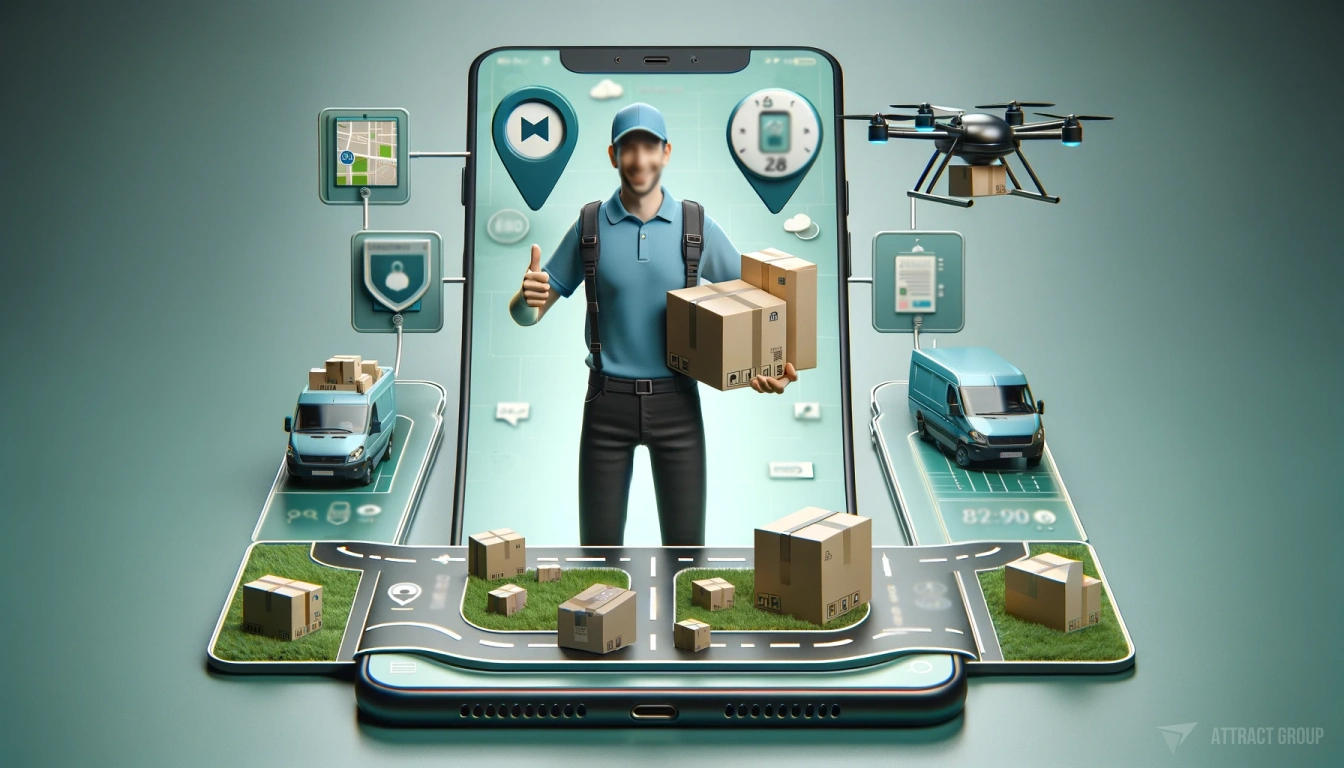
Some of the noteworthy features of fleet management mobile apps include:
- Real-time tracking of vehicle locations and driver activities
- Route optimization for fuel efficiency and decreased delivery times
- Maintenance reminders and the ability to schedule service appointments
- Comprehensive reporting on fleet performance, fuel consumption, and driver productivity
- Integration with other logistics software to ensure seamless data sharing
By leveraging the capabilities provided by fleet management mobile apps, logistics companies can stay informed about their fleet’s activities and gain valuable insights to make well-informed decisions, ultimately enabling them to cut costs and optimize resource allocation. The result is a more streamlined operation, accomplished through better planning and coordination.
Fleet management apps aid logistics companies in managing their fleets with greater efficacy, enhancing safety and optimizing fleet usage.
Fleet management mobile apps promote improved communication among drivers, dispatchers, and managers, fostering a more connected and collaborative environment. Drivers can access relevant information pertaining to their routes, delivery schedules, and vehicle status, while managers and dispatchers can monitor their performance, provide real-time updates on job progress, and offer timely support when needed. This improved communication promotes a smoother workflow and more efficient delivery processes.
The following table illustrates some of the key benefits provided by fleet management mobile apps for logistics companies:
| Benefits | Description |
|---|---|
| Increased Efficiency | Apps enable better route planning, optimized resource allocation, and real-time data to improve overall workflow. |
| Enhanced Safety | Real-time tracking and driver performance monitoring help identify potential safety risks and address them promptly. |
| Cost Savings | Fleet management apps help reduce operational expenses by optimizing resource usage, route planning, and maintenance schedules. |
| Better Communication | By enabling communication between drivers, dispatchers, and managers, fleet management apps promote a more connected and coordinated logistics environment. |
Fleet management mobile apps noticeably streamline fleet operations within the logistics industry. These apps not only provide real-time insights on vehicle and driver performance but also enable better resource management and coordination to enhance overall efficiency and safety. As technology continues to advance, it is imperative for logistics companies to harness the power of fleet management mobile apps to stay competitive and achieve operational excellence.
Order Management: Simplifying the Ordering Process Through Mobile Solutions
Efficient order management is a critical aspect of any successful logistics operation. Mobile order management systems have emerged as game-changers, automating and streamlining the entire ordering process, right from order creation to delivery execution. These systems empower companies to efficiently handle customer orders and provide a smooth and elevated overall customer experience.
Mobile solutions for order management have redefined logistics operations by enhancing communication channels, minimizing processing times, and improving customer satisfaction.
Integrating mobile order management systems into the logistics operations offers several advantages that lead to efficient logistics ordering:
- Automated Order Creation: Mobile solutions facilitate quick and easy order creation, reducing manual data entry errors and saving valuable time.
- Real-time Order Status Updates: These systems provide instant order updates, notifying customers and logistics teams about the progress of orders in real-time.
- Streamlined Communication: Improved communication channels between customers, logistics service providers, and transportation carriers result in better coordination and enhanced service quality.
- Inventory Synchronization: Mobile order management systems sync with inventory levels, ensuring that orders are fulfilled accurately and promptly.
- Electronic Invoicing: Paperless billing and payment confirmation reduce the hassle of managing physical paperwork, saving time and resources.
Our team can build automated mobile order management systems to simplify logistics operations, reduce errors, and improve customer experience
A well-executed mobile order management system significantly contributes to the overall success of logistics operations. Companies implementing these solutions are better equipped to meet customers’ needs, effectively growing their businesses and maintaining a competitive edge in the logistics landscape.
Delivery Tracking: Ensuring Transparency in the Delivery Process
Delivery tracking is a critical aspect of the logistics industry, providing much-needed transparency and improved communication between logistics companies, drivers, and customers. The implementation of mobile notifications and mobile proof of delivery features ensure efficient and secure delivery processes while offering increased accountability and customer satisfaction.

Utilizing Mobile Notifications for Delivery Updates
Mobile notifications for logistics help keep all parties involved in the delivery process informed by providing real-time updates on the shipment’s status and location. Instant alerts enable customers to track their parcels and receive timely information on any discrepancies or disruptions, enhancing the overall customer experience. Additionally, mobile notifications foster clear and open communication between logistics companies, drivers, and customers, contributing to a seamless delivery process that meets or even exceeds customer expectations.
Mobile Proof of Delivery for Accountability
Integrating mobile proof of delivery features within logistics apps ensures a higher level of accountability in the delivery process. Drivers can collect electronic signatures or other forms of proof upon the successful delivery of the shipment. This incontrovertible evidence is beneficial for all parties, including logistics companies, drivers, and customers, who can be more confident in the delivery’s completion and the information collected.
Mobile notifications and mobile proof of delivery streamline the delivery process, offer increased transparency, and enhance accountability within logistics operations.
In summary, mobile notifications and mobile proof of delivery features are essential components of logistics apps that contribute to the efficiency, transparency, and security of the delivery process. By efficiently communicating delivery updates and providing verifiable proof of delivery, logistics companies can significantly improve their customer satisfaction levels and strengthen their position in the competitive logistics market.
The Role of Mobile Apps in Supply Chain Visibility
Supply chain visibility is an essential factor that impacts nearly every aspect of a logistics company. By providing real-time updates, streamlining communication, and ensuring shared access to pertinent information, mobile apps have become indispensable tools in elevating collaboration among supply chain partners.
Through advanced features and integrations, logistics mobile apps offer improved visibility and enhance overall supply chain performance. The following subsection highlights how mobile apps contribute to better collaboration and cohesion within the logistics ecosystem.
Elevating Collaboration Among Supply Chain Partners
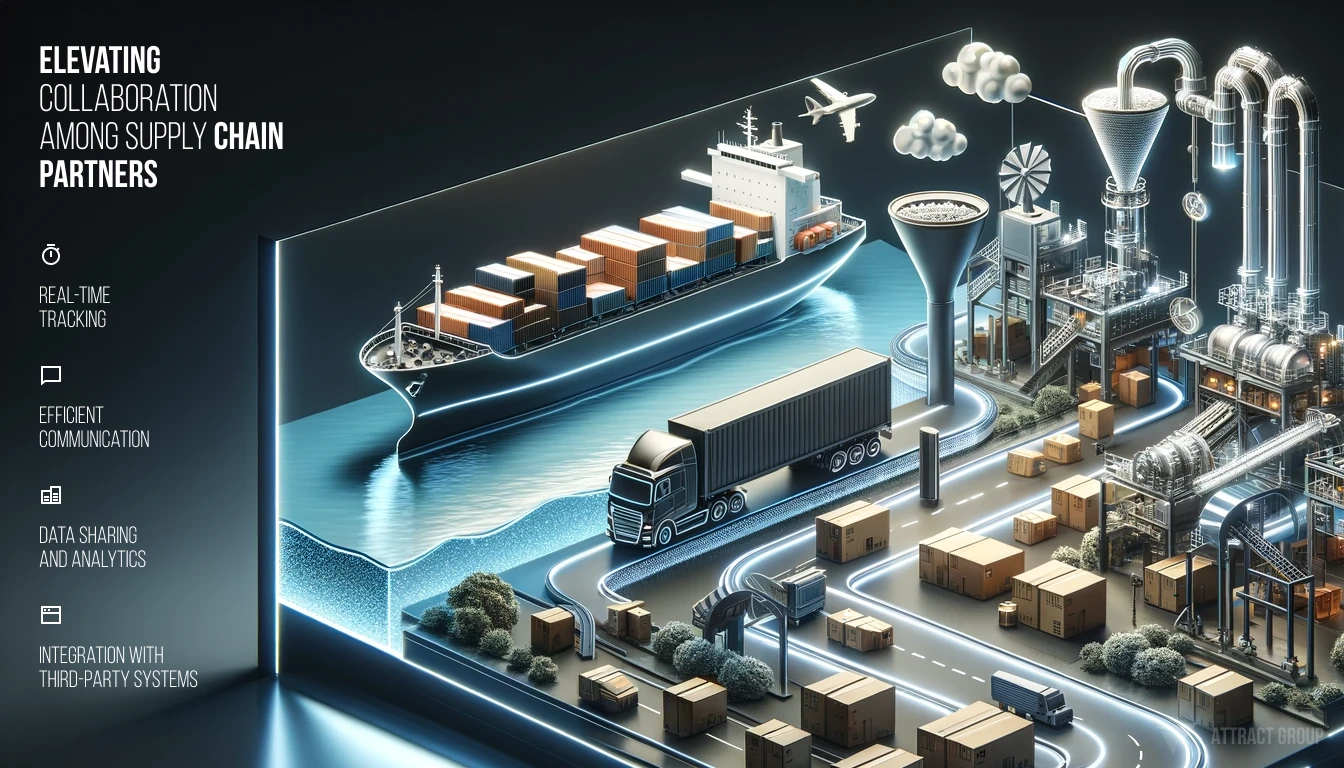
- Real-time tracking: GPS technology enables real-time updates on shipments, fleet locations, and warehouse operations ultimately boosting collaboration in supply chain logistics.
- Efficient communication: Logistics apps facilitate seamless communication between stakeholders, providing a platform for instant messaging, alerts, and notifications, ensuring all partners are in sync and up to date on relevant information.
- Data sharing and analytics: Mobile apps provide shared access to relevant performance metrics and analytics, allowing supply chain partners to make data-driven decisions and optimize operational efficiency.
- Integration with third-party systems: Many logistics mobile apps offer compatibility with enterprise systems like ERP and TMS. Integrating these systems enhances operational transparency and streamlines processes across the supply chain.
| Mobile App Feature | Benefits for Supply Chain Collaboration |
|---|---|
| Real-time tracking | Enhanced transparency, improved coordination, and proactive decision-making. |
| Efficient communication | Better alignment among partners, clearer expectations, and faster response times. |
| Data sharing and analytics | Data-driven decision-making, operational optimization, and continuous improvement. |
| Integration with third-party systems | Streamlined processes, increased visibility, and unified data sources. |
As logistics companies embrace digital transformation, mobile apps continue to play a pivotal role in providing increased visibility and collaboration, making them an essential tool in a competitive logistics landscape.
Conclusion
Logistics and shipping mobile apps have undoubtedly revolutionized the industry, delivering a wide array of advantages such as enhanced efficiency, seamless operations, and elevated customer satisfaction. As technology rapidly advances and user expectations escalate, logistics companies must adapt and evolve, refining their mobile app features to meet the dynamic demands within the sector.
By investing in mobile app development, logistics businesses not only position themselves as future-oriented but also secure a competitive edge. In a rapidly transforming landscape, it is imperative for logistics companies to leverage state-of-the-art technologies and capitalize on opportunities that allow them to surpass their competition and maintain relevance.
Work with our expert team to build cutting-edge, customizable logistics and shipping mobile apps that evolve with the industry landscape
The future of logistics apps appears promising, with continual advancements and innovations expected in the coming years. As we look forward, we can anticipate that mobile apps will keep playing a critical role in shaping the logistics and shipping industry, driving efficiency and productivity to unprecedented heights.
FAQ
How have mobile logistics and shipping apps evolved over time?
These apps have come a long way in handling and optimizing supply chains, covering areas such as supply chain management, fleet and driver management, inventory management, and delivery. Innovations in app development have significantly improved delivery times, storage safety, and overall operational efficiency.
What are the benefits of real-time tracking in logistics mobile apps?
Real-time tracking allows companies to monitor orders, shipments, and fleet with greater transparency. Users can view shipment locations, speeds, routes, and estimated times of arrival, receiving immediate notifications and updates about potential disruptions or discrepancies in the delivery process.
How do mobile apps revolutionize inventory management in logistics?
Mobile apps automate tracking and data entry processes, providing accurate stock level data and enabling warehouse managers to respond proactively to changes. AI-based logistics mobile apps optimize warehouse space and provide timely inventory status updates, preventing understocking and overstocking.
What are the essential features to include in a logistics mobile app?
A competent logistics mobile app should have features like truck tracking with GPS, route optimization, multilingual support, offline functionality, and communication capabilities for drivers and managers. Real-time vehicle location, electronic billing, payment confirmation, and efficient fleet management are also vital.
How do route optimization algorithms help save time and fuel in logistics?
Route optimization algorithms embedded in logistics apps consider factors like traffic conditions, delivery prioritization, and efficient paths to enhance dispatch management, productivity, and fuel savings. This results in a competitive advantage for logistics businesses.
What is the role of mobile apps in supply chain visibility?
Mobile apps enhance supply chain visibility by streamlining communication and providing real-time updates. They ensure shared access to vital information, which in turn reinforces partnerships and contributes to a more cohesive supply chain network.










